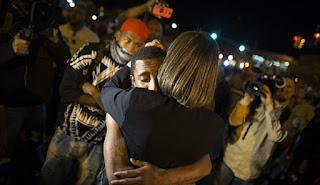A Wrinkle in Time, Madeleine L'Engle
First, sorry for the crappy image, but this is the cover of my copy and nothing else will do.
I seriously cannot believe this novel only gets 4.04 stars on Goodreads. It is one of my all-time favoritest books of forever. I'm not even exaggerating. Let me tell you why.
Meg is, like, the best girl hero every imagined. (Yes, I went Valley Girl on that.) She is the quintessential awkward tween girl without the pack of friends to make those years bearable. And let's face it, those years suck, even when they don't. She doesn't go through some physical transformation that turns her ugly duckling into a beautiful swan. What she does is realize, on her own, that her character alone is what is going to get her family back together after an intergalactic error. And when I say that, I don't mean that Meg alone is what is going to do it, I mean a vital and unchangeable portion of the very essence of Meg is what does. (This would be a lot easier to talk about if I was ok giving spoilers, but I really want you to read this book. And if you already have, I want you to read it again.)
That's pretty much it. Meg rules. There are other good things about the story, including the moment when Meg declares, "Like and equal are not the same thing at all." But her grrrl power just overshadows everything else I could say. Every time I read this one, I pick up on something new or something I have forgotten. And I'm sad to say that I have not read the whole series. I promise myself I will rectify that error as soon as this challenge is over. I'm really looking forward to A Swiftly Tilting Planet because it is beloved by a friend whose judgement in these things I really value.
One interesting thing that I did not pick up on in the past, perhaps because I didn't think about the subject often, is that it's possible that L'Engle was writing about a family with Autism in the early 1960's. Let that sink in a minute. Now consider- both parents are brilliant, as is Charles Wallace. But they aren't just smart. They think in such unusual ways that they are able to understand the inexplicable. I could be way off on this one. Maybe she was elevating them to more enlightened creatures and I misinterpreted. It could happen. But maybe these two things are not mutually exclusive and she tapped into something that didn't enter common conversation for four more decades. I can't wait to see what else she has in store for me.
Wrinkle joins Mockingbird on my forever bookshelf to which I will return again and again. Meg alone earns 4.75 of its 5 Marias. Seriously, I love this girl.
First, sorry for the crappy image, but this is the cover of my copy and nothing else will do.
I seriously cannot believe this novel only gets 4.04 stars on Goodreads. It is one of my all-time favoritest books of forever. I'm not even exaggerating. Let me tell you why.
Meg is, like, the best girl hero every imagined. (Yes, I went Valley Girl on that.) She is the quintessential awkward tween girl without the pack of friends to make those years bearable. And let's face it, those years suck, even when they don't. She doesn't go through some physical transformation that turns her ugly duckling into a beautiful swan. What she does is realize, on her own, that her character alone is what is going to get her family back together after an intergalactic error. And when I say that, I don't mean that Meg alone is what is going to do it, I mean a vital and unchangeable portion of the very essence of Meg is what does. (This would be a lot easier to talk about if I was ok giving spoilers, but I really want you to read this book. And if you already have, I want you to read it again.)
That's pretty much it. Meg rules. There are other good things about the story, including the moment when Meg declares, "Like and equal are not the same thing at all." But her grrrl power just overshadows everything else I could say. Every time I read this one, I pick up on something new or something I have forgotten. And I'm sad to say that I have not read the whole series. I promise myself I will rectify that error as soon as this challenge is over. I'm really looking forward to A Swiftly Tilting Planet because it is beloved by a friend whose judgement in these things I really value.
One interesting thing that I did not pick up on in the past, perhaps because I didn't think about the subject often, is that it's possible that L'Engle was writing about a family with Autism in the early 1960's. Let that sink in a minute. Now consider- both parents are brilliant, as is Charles Wallace. But they aren't just smart. They think in such unusual ways that they are able to understand the inexplicable. I could be way off on this one. Maybe she was elevating them to more enlightened creatures and I misinterpreted. It could happen. But maybe these two things are not mutually exclusive and she tapped into something that didn't enter common conversation for four more decades. I can't wait to see what else she has in store for me.
Wrinkle joins Mockingbird on my forever bookshelf to which I will return again and again. Meg alone earns 4.75 of its 5 Marias. Seriously, I love this girl.







